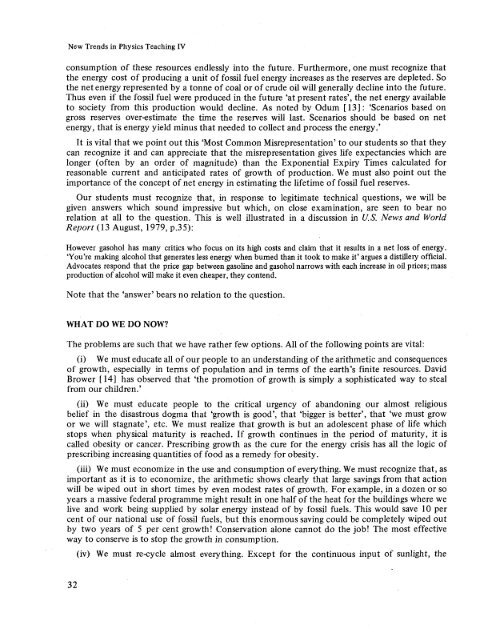New trends in physics teaching, v.4; The ... - unesdoc - Unesco
New trends in physics teaching, v.4; The ... - unesdoc - Unesco
New trends in physics teaching, v.4; The ... - unesdoc - Unesco
You also want an ePaper? Increase the reach of your titles
YUMPU automatically turns print PDFs into web optimized ePapers that Google loves.
<strong>New</strong> Trends <strong>in</strong> Physics Teach<strong>in</strong>g IV<br />
consumption of these resources endlessly <strong>in</strong>to the future. Furthermore, one must recognize that<br />
the energy cost of produc<strong>in</strong>g a unit of fossil fuel energy <strong>in</strong>creases as the reserves are depleted. So<br />
the net energy represented by a tonne of coal or of crude oil will generally decl<strong>in</strong>e <strong>in</strong>to the future.<br />
Thus even if the fossil fuel were produced <strong>in</strong> the future ‘at present rates’, the net energy available<br />
to society from this production would decl<strong>in</strong>e. As noted by Odum [ 131 : ‘Scenarios based on<br />
gross reserves overestimate the time the reserves wil last. Scenarios should be based on net<br />
energy, that is energy yield m<strong>in</strong>us that needed to collect and process the energy.’<br />
It is vital that we po<strong>in</strong>t out this ‘Most Common Misrepresentation’ to our students so that they<br />
can recognize it and can appreciate that the misrepresentation gives life expectancies which are<br />
longer (often by an order of magnitude) than the Exponential Expiry Times calculated for<br />
reasonable current and anticipated rates of growth of production. We must also po<strong>in</strong>t out the<br />
importance of the concept of net energy <strong>in</strong> estimat<strong>in</strong>g the lifetime of fossil fuel reserves.<br />
Our students must recognize that, <strong>in</strong> response to legitimate technical questions, we wil be<br />
given answers which sound impressive but which, on close exam<strong>in</strong>ation, are seen to bear no<br />
relation at all to the question. This is well illustrated <strong>in</strong> a discussion <strong>in</strong> US. <strong>New</strong>s and World<br />
Report (13 August, 1979, p.35):<br />
However gasohol has many critics who focus on its hgh costs and claim that it results <strong>in</strong> a net loss of energy.<br />
‘You’re mak<strong>in</strong>g alcohol that generates less energy when burned than it took to make it’ argues a distillery official.<br />
Advocates respond that the price gap between gasol<strong>in</strong>e and gasohol narrows with each <strong>in</strong>crease <strong>in</strong> oil prices; mass<br />
production of alcohol wil make it even cheaper, they contend.<br />
Note that the ‘answer’ bears no relation to the question.<br />
WHAT DO WE DO NOW?<br />
<strong>The</strong> problems are such that we have rather few options. All of the follow<strong>in</strong>g po<strong>in</strong>ts are vital:<br />
(i) We must educate all of our people to an understand<strong>in</strong>g of the arithmetic and consequences<br />
of growth, especially <strong>in</strong> terms of population and <strong>in</strong> terms of the earth’s f<strong>in</strong>ite resources. David<br />
Brower [ 141 has observed that ‘the promotion of growth is simply a sophisticated way to steal<br />
from our children.’<br />
(ii) We must educate people to the critical urgency of abandon<strong>in</strong>g our almost religious<br />
belief <strong>in</strong> the disastrous dogma that ‘growth is good’, that ‘bigger is better’, that ‘we must grow<br />
or we will stagnate’, etc. We must realize that growth is but an adolescent phase of life which<br />
stops when physical maturity is reached. If growth cont<strong>in</strong>ues <strong>in</strong> the period of maturity, it is<br />
called obesity or cancer. Prescrib<strong>in</strong>g growth as the cure for the energy crisis has all the logic of<br />
prescrib<strong>in</strong>g <strong>in</strong>creas<strong>in</strong>g quantities of food as a remedy for obesity.<br />
(iii) We must economize <strong>in</strong> the use and consumption of everyth<strong>in</strong>g. We must recognize that, as<br />
important as it is to economize, the arithmetic shows clearly that large sav<strong>in</strong>gs from that action<br />
wil be wiped out <strong>in</strong> short times by even modest rates of growth. For example, <strong>in</strong> a dozen or so<br />
years a massive federal programme might result <strong>in</strong> one half of the heat for the build<strong>in</strong>gs where we<br />
live and work be<strong>in</strong>g supplied by solar energy <strong>in</strong>stead of by fossil fuels. This would save 10 per<br />
cent of our national use of fossil fuels, but this enormous sav<strong>in</strong>g could be completely wiped out<br />
by two years of 5 per cent growth! Conservation alone cannot do the job! <strong>The</strong> most effective<br />
way to conserve is to stop the growth <strong>in</strong> consumption.<br />
(iv) We must re-cycle almost everyth<strong>in</strong>g. Except for the cont<strong>in</strong>uous <strong>in</strong>put of sunlight, the<br />
32
















